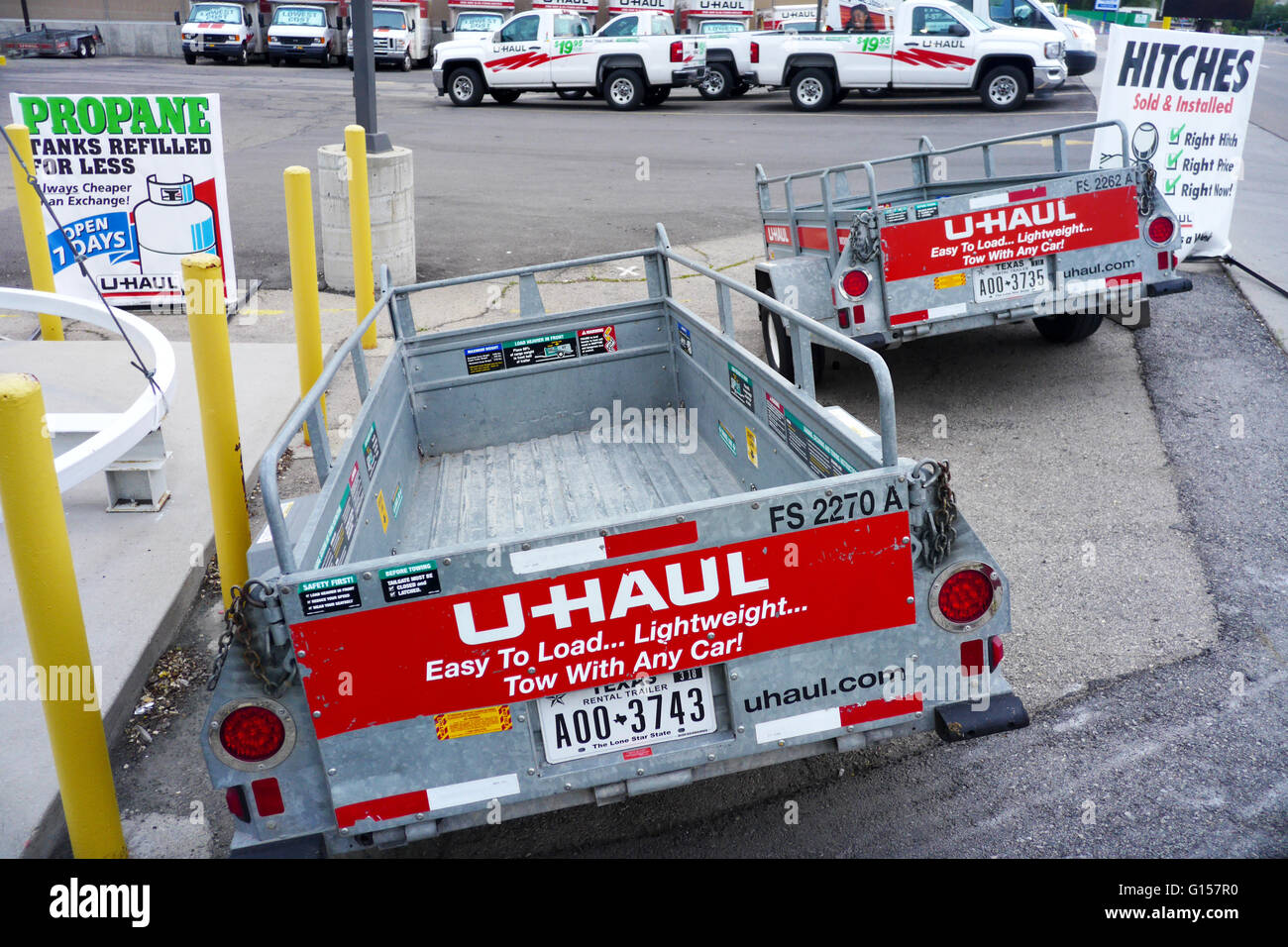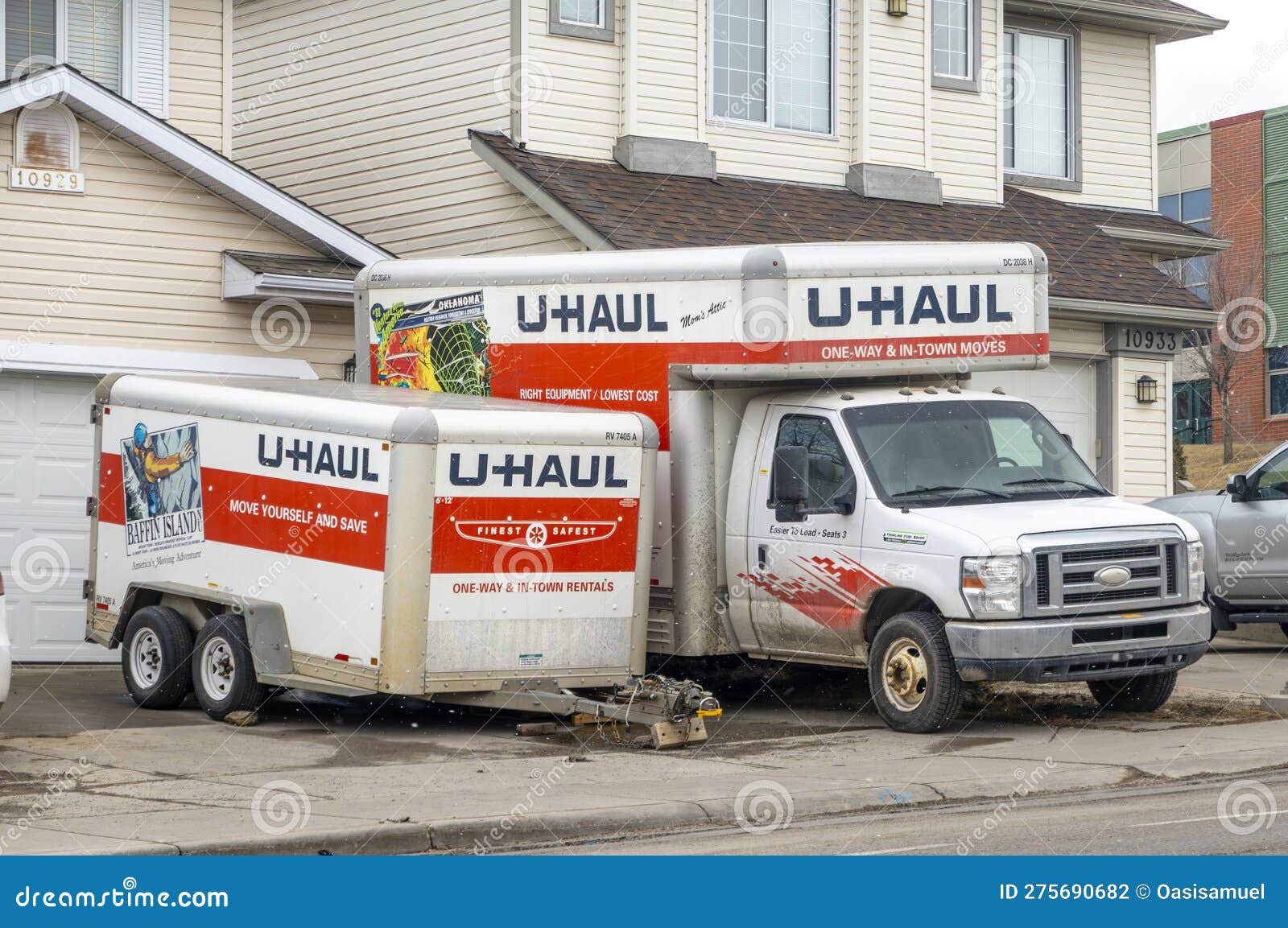Moving a vehicle, whether it's across town or across the country, can be a logistical challenge. Driving it yourself adds wear and tear, consumes valuable time, and incurs fuel costs. That's where U-Haul car trailer rental steps in as a convenient and cost-effective solution. This guide provides a comprehensive overview of U-Haul car trailers, covering everything from types and benefits to rental procedures and safety considerations. Whether you're a first-time user or a seasoned mover, this article will equip you with the knowledge to navigate the U-Haul car trailer rental process with confidence.
What is a U-Haul Car Trailer?
U-Haul Car Trailer Rental: Your Complete Guide to Safe and Efficient Vehicle Transport
A U-Haul car trailer is a specialized trailer designed for safely transporting passenger vehicles. Unlike open utility trailers, car trailers are specifically engineered to accommodate the weight and dimensions of cars, trucks, and SUVs. They feature integrated tie-down systems to secure the vehicle during transit, ensuring it remains stable and protected from damage. U-Haul offers two primary types of car trailers: the Auto Transport and the Tow Dolly. The Auto Transport is a full trailer where all four wheels of the vehicle are secured onto the trailer. The Tow Dolly is a two-wheeled trailer where the front wheels of the vehicle are secured, while the rear wheels remain on the road.
Why Choose a U-Haul Car Trailer? The Benefits
Renting a U-Haul car trailer offers several advantages over other vehicle transport methods:
- Cost-Effectiveness: Often cheaper than hiring a professional auto transport company, especially for shorter distances. It also eliminates the cost of fuel, lodging, and meals associated with driving the vehicle yourself.
- Convenience: U-Haul has a vast network of locations, making it easy to pick up and drop off the trailer. You can also reserve online or by phone, streamlining the rental process.
- Vehicle Protection: Car trailers protect your vehicle from road debris, weather elements, and excessive mileage.
- Time Savings: Avoid long drives and free up your time for other moving-related tasks.
- Flexibility: Choose the trailer type that best suits your vehicle and towing capacity.
- DIY Control: You are in control of the moving schedule and route.

Understanding the Different Types of U-Haul Car Trailers
U-Haul offers two main types of car trailers, each suited for different vehicles and towing capabilities:

-
Auto Transport: This is a flatbed trailer designed to carry the entire vehicle. All four wheels are secured to the trailer, offering maximum protection.
- Ideal for: Vehicles with all-wheel drive, low clearance, or those that cannot be towed with two wheels on the ground.
- Weight Capacity: Typically around 5,290 lbs.
- Requirements: Requires a vehicle with a higher towing capacity and a 2" hitch ball.

-
Tow Dolly: This is a two-wheeled trailer designed to tow vehicles with the front wheels lifted off the ground.
- Ideal for: Front-wheel drive vehicles. Rear-wheel drive vehicles can be towed if the driveshaft is disconnected or the vehicle is placed in neutral (consult your vehicle's owner's manual).
- Weight Capacity: Typically around 3,450 lbs.
- Requirements: Requires a vehicle with a suitable towing capacity and a 1-7/8" or 2" hitch ball.
How to Rent a U-Haul Car Trailer: A Step-by-Step Guide
Renting a U-Haul car trailer is a straightforward process:
- Determine Your Needs: Identify the type of vehicle you need to transport, its weight, and the distance you'll be traveling. This will help you determine which trailer type is suitable.
- Check Vehicle Compatibility: Use the U-Haul website or contact a U-Haul representative to ensure your towing vehicle and the vehicle being towed are compatible with the chosen trailer. Crucially, verify the towing capacity of your tow vehicle.
- Reserve Online or by Phone: Visit the U-Haul website (uhaul.com) or call their customer service to make a reservation. Provide the necessary information, including your pickup and drop-off locations, dates, and vehicle details. Booking in advance is highly recommended, especially during peak moving seasons.
- Gather Required Documents: On the pickup day, bring your driver's license, the towing vehicle's registration, and proof of insurance.
- Pick Up the Trailer: Inspect the trailer thoroughly for any damage before accepting it. Take photos or videos as evidence of its condition. Ensure all lights are working correctly.
- Connect the Trailer: Follow U-Haul's instructions for safely connecting the trailer to your towing vehicle. This includes attaching the hitch, safety chains, and lights.
- Load the Vehicle: Carefully load the vehicle onto the trailer, following U-Haul's guidelines for proper positioning and securing. Use the provided straps or chains to secure the vehicle tightly. Double-check all connections before driving.
- Drive Safely: Drive at a safe speed, especially on highways. Allow extra braking distance and be aware of the trailer's added length and width.
- Drop Off the Trailer: Return the trailer to the designated U-Haul location on or before the agreed-upon return date. Ensure the trailer is clean and free of debris.
Important Considerations and Safety Tips
- Towing Capacity: This is the most crucial factor. Exceeding your vehicle's towing capacity can lead to accidents and damage to your vehicle. Consult your vehicle's owner's manual or a mechanic to determine its towing capacity.
- Hitch Requirements: Ensure your towing vehicle has the correct hitch size and class for the chosen trailer. U-Haul can provide hitches and install them if needed.
- Weight Distribution: Load the vehicle evenly on the trailer to maintain stability.
- Tire Pressure: Check the tire pressure of both the towing vehicle and the trailer before each trip.
- Lights and Signals: Verify that all lights and signals on the trailer are functioning correctly.
- Driving Speed: Reduce your speed when towing a trailer, especially on highways or in windy conditions.
- Braking Distance: Allow extra braking distance when towing a trailer.
- Turning: Make wider turns than usual to avoid hitting curbs or other objects.
- Insurance: Ensure your insurance policy covers towing a trailer. Consider purchasing additional coverage if needed.
- U-Haul's Safe Trailering Guidelines: U-Haul provides comprehensive safe trailering guidelines on their website and at their locations. Review these guidelines carefully before renting a trailer.
Potential Challenges and Solutions
- Trailer Availability: During peak moving seasons, trailers may be in high demand. Reserve well in advance to avoid disappointment.
- Solution: Book your trailer at least two weeks in advance, if possible. Consider alternative pickup locations if your preferred location is unavailable.
- Towing Vehicle Compatibility: Your towing vehicle may not be compatible with the desired trailer.
- Solution: Use the U-Haul website or contact a U-Haul representative to verify compatibility. Consider renting a U-Haul truck if your vehicle is not suitable for towing.
- Difficulty Loading the Vehicle: Loading a vehicle onto a trailer can be challenging, especially for inexperienced users.
- Solution: Watch U-Haul's instructional videos on loading vehicles onto trailers. Enlist the help of a friend or family member. Take your time and be careful.
- Trailer Malfunctions: Trailers can experience malfunctions, such as flat tires or brake problems.
- Solution: Inspect the trailer thoroughly before accepting it. Carry a spare tire and tools. Contact U-Haul Roadside Assistance if you experience any problems during your trip.
U-Haul Car Trailer Rental Price Table (Estimates)
| Trailer Type | Local (In-Town) Rental (Per Day) | One-Way Rental (Estimate based on Distance) | Security Deposit (Typically) | Notes |
|---|---|---|---|---|
| Auto Transport | $54.95+ | $200 - $1000+ (Varies Greatly) | $0 (credit card required) | Best for all-wheel drive, low clearance vehicles. Requires a 2" hitch ball. |
| Tow Dolly | $44.95+ | $150 - $700+ (Varies Greatly) | $0 (credit card required) | Best for front-wheel drive vehicles. Requires 1-7/8" or 2" hitch ball. |
| Hitch Installation | Varies | N/A | N/A | Price depends on vehicle and hitch type. Contact U-Haul for a quote. |
| SafeMove Insurance | Varies | Included in some reservations | N/A | Covers damage to the U-Haul equipment. Supplemental coverage for towed vehicle is recommended. |
Disclaimer: Prices are estimates and can vary based on location, time of year, and availability. Contact U-Haul directly for accurate pricing.
Frequently Asked Questions (FAQ)
-
Q: What is the difference between an Auto Transport and a Tow Dolly?
- A: The Auto Transport carries the entire vehicle on the trailer, while the Tow Dolly only carries the front wheels. Auto Transports are generally safer and recommended for all-wheel drive or low-clearance vehicles.
-
Q: How do I determine the towing capacity of my vehicle?
- A: Consult your vehicle's owner's manual or contact a mechanic. Do not exceed the manufacturer's recommended towing capacity.
-
Q: What size hitch ball do I need?
- A: Auto Transports require a 2" hitch ball, while Tow Dollies typically require a 1-7/8" or 2" hitch ball.
-
Q: Do I need to disconnect the driveshaft when using a Tow Dolly for a rear-wheel drive vehicle?
- A: It depends on the vehicle. Consult your vehicle's owner's manual. If required, disconnecting the driveshaft can be complex and may require professional assistance.
-
Q: What happens if I damage the trailer?
- A: You are responsible for any damage to the trailer. Consider purchasing SafeMove insurance to cover potential damages.
-
Q: Can I drop off the trailer at a different location than where I picked it up?
- A: Yes, U-Haul allows one-way rentals. Specify your pickup and drop-off locations when making your reservation.
-
Q: What if I need to cancel my reservation?
- A: U-Haul has a cancellation policy. Check the terms and conditions of your reservation for details.
-
Q: Does U-Haul install hitches?
- A: Yes, U-Haul can install hitches at many of their locations. Contact your local U-Haul for a quote.
Conclusion
Renting a U-Haul car trailer can be a convenient and cost-effective solution for transporting your vehicle. By understanding the different trailer types, following safety guidelines, and planning ahead, you can ensure a smooth and successful move. Remember to prioritize safety, verify compatibility, and always adhere to U-Haul's instructions. With proper preparation and attention to detail, you can confidently transport your vehicle and enjoy a stress-free moving experience.
0 comments